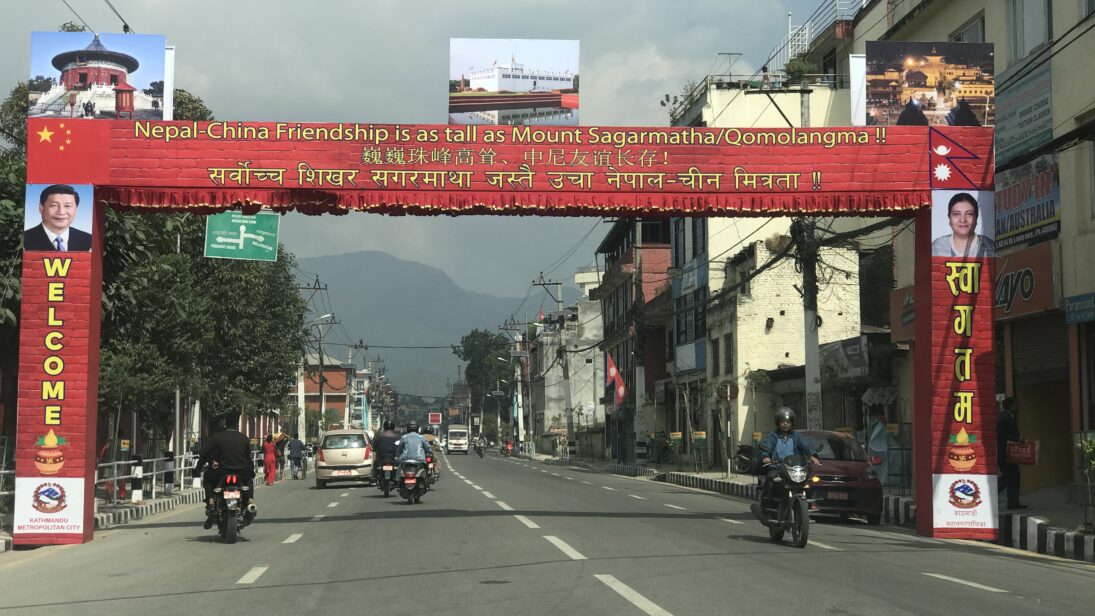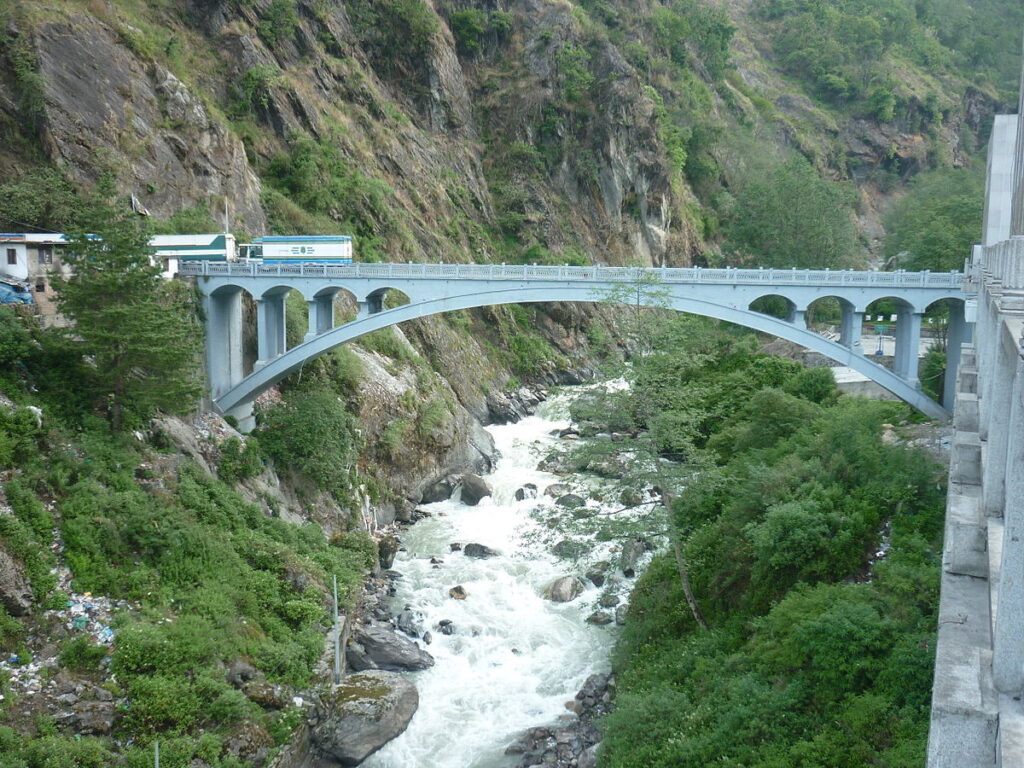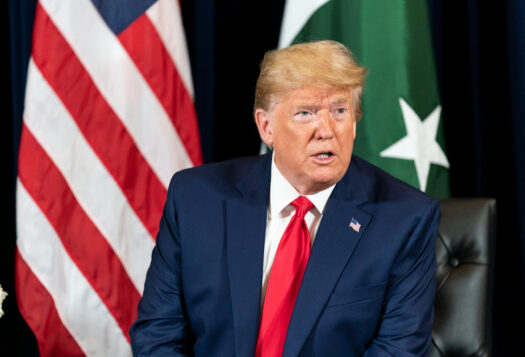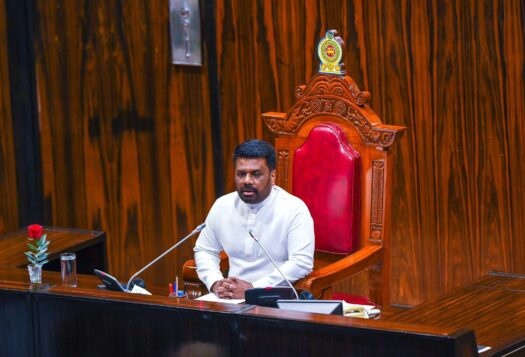
As its next-door neighbor as well as a longstanding economic partner, Nepal’s relations with China are multifaceted in the political, economic, and security dimensions. From a geopolitical lens, Nepal’s foreign policy has traditionally been concerned with India and China. However, the growing interest of the United States in the region may put the Himalayan nation in a three-way push and pull. In line with its principles of non-alignment, Nepal should carefully orient its foreign policy in such a way that its relations with China will in no way lead to it getting engulfed in great power rivalry. Rather, Nepal can use its geostrategic positioning to reap economic benefits from all three countries – India, China, and the United States.
Political Relations with China
From China’s perspective, a communist party at the helm of Nepal’s domestic politics would be more likely to further China’s interests in the country. This explains why reports have speculated that the unification of the Communist Party of Nepal (Unified Marxist Leninist) and Communist Party of Nepal (Maoist Center) to form the Nepal Communist Party (NCP) in 2018 was aided by the influence of the Chinese Communist Party.
Although the NCP nearly commanded a two-thirds majority in parliament, it did not last a full term, exposing the limits of Chinese influence in the domestic politics of Nepal. The current coalition government led by CPN (MC) chair Pushpa Kamal Dahal ‘Prachanda’ has shown an ambiguous position regarding its relations with China. Dahal declined an invitation to the Boao Forum in China in March, instead choosing to visit India before China, which he did in June.
Although the NCP nearly commanded a two-thirds majority in parliament, it did not last a full term, exposing the limits of Chinese influence in the domestic politics of Nepal.
Two issues remain of key importance to Chinese political interests in Nepal: securing Nepal’s continued support of the “One China” policy and ensuring that the 12,000 Tibetan refugees who reside in Kathmandu do not engage in anti-China activities. Nepal has been steadfast in upholding both these principles. As a small and immediate neighbor of a global power, Nepal should stick to this policy to avoid any sort of political and economic backlash from China. At the same time, Kathmandu’s continued refusal to sign an extradition treaty with Beijing is a sign of the country’s resilient stance of not compromising its independent position on certain matters.
Economic and Development Scenario
Although much as been made of the Nepal-China relationship being a mutually beneficial partnership, economic progress and infrastructure development has remained stagnant since Nepal became signatory to China’s Belt and Road Initiative in 2017. No progress has been made on the nine projects that Nepal selected for the BRI. These include the upgradation and repair of Araniko and Syaphrubesi-Rasuwagadhi Highways and the development of the Koshi, Gandaki, and Karnali economic corridors. Making matters worse, the Chinese ambassador to Nepal recently caused a stir when he claimed that the newly inaugurated Pokhara International Airport was built under the BRI framework, when in reality, it was built through a separate Chinese loan agreement that preceded the BRI.
Furthermore, the countries appear to diverge over their preferred funding modalities for BRI projects. Nepal has stated that it is not in a position to take loans for BRI projects considering the ongoing stress on its economy but would rather projects be built on grants. While the feasibility of this is in question given China’s BRI approach in other countries, Beijing may consider building the much-hyped Kerung-Kathmandu railway on a grant basis if it feels such a move could help to enhance its image in the country and counter growing Indian and American influence.
Finally, trade relations between Nepal and China do not paint a rosy picture for the former. In 2021-22, Nepal’s exports to China amounted to USD $5.39 million, while imports from China totaled USD $1.84 billion. There have also been gaps in China’s pledged FDI in Nepal and the actual FDI. For example, a Chinese contractor has delayed the 756-Megawatt Tamor Hydropower Project that the countries agreed to in 2019 and has failed to provide an explanation.
Dahal is planning to visit Beijing in September. He should take up the agenda of providing preferential and easy access to Nepali goods and services in the Chinese market so that the trade deficit is reduced. He should also urge the Chinese side to implement agreements made during President Xi Jinping’s visit to Kathmandu in 2019 and give notice that Nepal may be compelled to look for other investor options in case of major project delays, including the hydropower sector. Most importantly, Dahal should clearly spell out the expectations of Nepal vis-à-vis some ambiguities surrounding the BRI, such as the feasibility of grant-based projects.
The feasibility study for the high-cost Kerung-Kathmandu railway connectivity is ongoing. Such a railway link across the Himalayas would be a milestone in Sino-Nepali relations. However, Nepal is not in a position to undertake mega projects through loans that might undermine its economic stability. Therefore, this railway project may be viable only if it is built on a Chinese grant. Considering BRI is not a grant-based initiative, it seems highly unlikely that China would agree to this. Delays in the BRI projects have tarnished China’s image in Nepal and Beijing may look to expedite them following Dahal’s visit to Beijing. It there are signs of a prolonged delay, it is preferable for Nepal to undertake future projects bilaterally with China rather than under the broader framework of BRI.

An Emerging Trilemma?
While Nepal should attempt to push China towards living up to its promises, it must also play a balancing act with two of China’s rivals, India and the United States. Being Nepal’s biggest developmental and trade partner, India would be the most likely source of FDI, particularly in the hydropower sector, if Chinese investors feel their return on investment is not guaranteed or sufficient. The U.S. focus on Nepal will continue to encompass support in areas like democracy, health, education, and governance rather than large-scale commercial ventures, given Nepal’s geostrategic significance within the U.S. Indo-Pacific Strategy.
As U.S.-India relations are blossoming by the day, the interests of both countries would align in countering Chinese influence in Nepal. This is where Nepal should be careful. To ensure its strategic autonomy, Nepal should engage politically and economically with all three countries without trying to play one country against the other. Although the ease of access to the sea will allow India to retain supremacy in Nepal’s trade sector, Kathmandu should expand its diplomatic outreach to attract FDI from beyond its immediate neighborhood to reduce its over-dependence on its southern neighbor.
In view of the grand strategic objectives of global powers, it is in the best interest of Nepal to not side with any power. While Nepal’s parliament ratified the Millennium Challenge Corporation (MCC) compact with the United States last year, the decision not to participate in the State Partnership Program indicates the government’s geopolitical balancing act. The implementation of the MCC will establish a strong backbone of electrical transmission lines to complement the growing hydropower production in the country
Nepal is less likely to be part of Chinese and American security projects, such as China’s Global Security Initiative and the U.S. State Partnership Program (SPP), despite insistence from Beijing and the Washington respectively. The abovementioned decisions of Nepal are in line with its foreign policy of expanding its developmental cooperation with multiple countries while simultaneously not being part of initiatives that have a military component attached to them.
Conclusion
Historically and constitutionally, Nepal’s foreign policy has been guided by the principles of Panchsheel and non-alignment. It should not sway from these long-standing guidelines that have preserved its sovereignty and independence throughout history. Nepal should clearly state to India, China, and the United States that it will not welcome any undue geopolitical maneuverings or pressure. India’s traditional role of an important political and economic actor in Nepal will not change. However, Nepal needs to find ways enhance relations with the United States and other developmental partners to diversify trade and investment options.
Nepal should clearly state to India, China, and the United States that it will not welcome any undue geopolitical maneuverings or pressure.
The bottom-line of Nepal’s policy should be to engage with all these countries for economic and developmental cooperation while steering clear of great power politics and any security related blocs, alliances, or initiatives. Nepal should continue supporting the ‘One China’ policy and make sure its land is not used against China by either Tibetan activists or other external powers. The Nepali leadership should prioritize specific BRI projects and seek a timeframe for their completion. China’s political and economic role is bound to increase in Nepal but the Himalayan country should be able to set its priorities right and decide what is best for its national interests.
Also Read: Major Corruption Scandal in Nepal Exposes Deep-Rooted Kleptocracy
***
Image 1: Welcome Arch for Xi Jinping via Flickr
Image 2: Nepal-China Friendship Bridge via Wikimedia Commons


